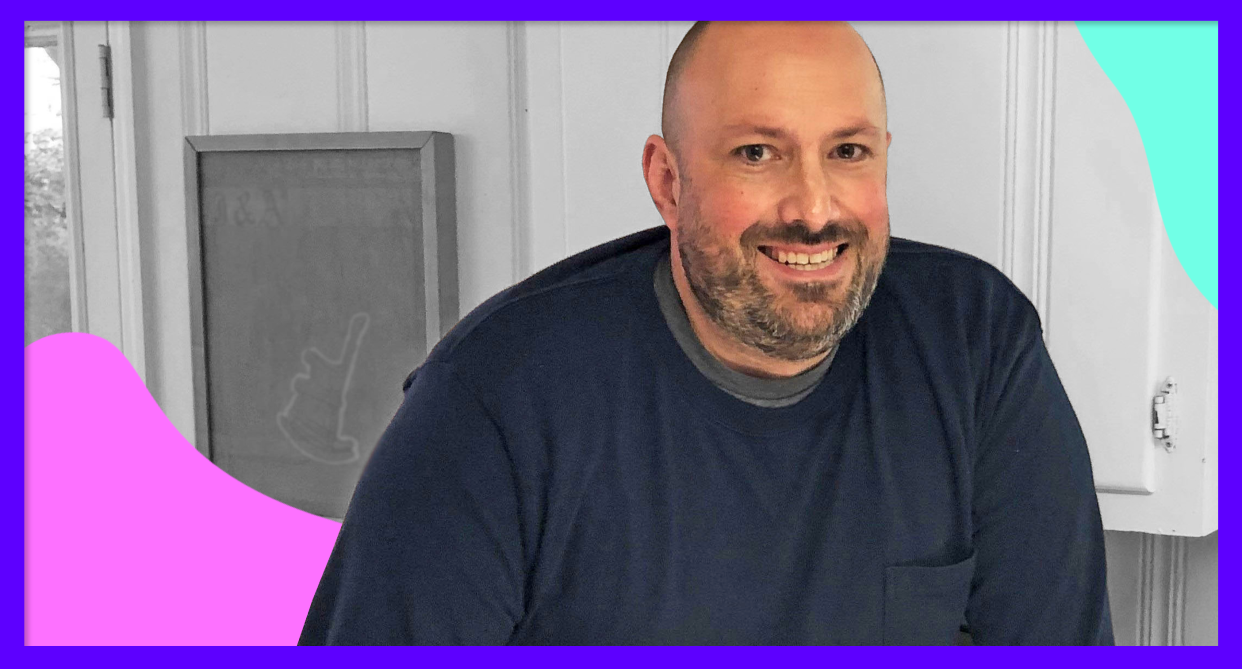‘I thought my heart failure was just asthma’: How regular exercise and medical therapy helped one man to 'feel a lot better'

Father of two John Sousa had asthma in the past, so he wasn’t overly concerned when he suddenly had trouble breathing in the summer of 2016. But his inhaler didn’t seem to be doing much to help.
“The trouble breathing kept getting worse,” he tells Yahoo Lifestyle. Sousa also started wheezing and would get easily tired while walking up stairs. He saw his doctor and was treated for a sinus infection with steroids and antibiotics, but it didn’t help for long. “I felt okay for a week and then it came back,” he says. “I went to the doctor and they gave me another round of steroids. I felt okay for maybe a couple of days but it kept coming back, and every time it was worse.”
Sousa was eventually sent to a clinic to get a breathing treatment and, while he was there, a nurse took his blood pressure, listened to his heart beat and gave him an electrocardiogram (EKG), a test that measures the electrical activity of the heartbeat. “That’s when I was told that something was wrong with my heart,” Sousa says. “I was overwhelmed and kind of in denial.”
Video: Find Out What You Need to Know About Heart Failure
Sousa wasn’t sent to the hospital, so he assumed his issue wasn’t bad.
But he saw a cardiologist a few weeks later and was given a diagnosis: He had heart failure, a condition where the heart can't pump enough blood to meet the body's needs.
“I was just floored. It didn’t compute really,” he says. Sousa was put on medication and says he lost 17 pounds “in a matter of days… that’s how much water I was retaining before the medication.”
Sousa was given a defibrillator vest to wear that monitored his heart and would shock him when his heartbeat was irregular. At one point, his vest started to sound an alarm and Sousa needed to see his doctor for a series of tests. “Each time I’d go back and they’d say, ‘You’re a little better, but not where you need to be,’” he says. “It was demoralizing because I was feeling better but doctors were telling me I wasn’t getting better.”
He was eventually told that he would need a defibrillator implanted in his chest. “That’s when it sunk in that this is my life now, and I’ve got to make changes,” Sousa says. “It was scary.”
Sousa admits that his diet “probably wasn’t ideal” at the time, so he started tracking how much salt that he ate and started eating more fresh vegetables.
A month after receiving his defibrillator, Sousa’s doctor also put him on a a combination drug that’s designed for people with heart failure. Sousa started exercising more and worked his way up to getting regular physical activity. He went to a mall across the street from his office to take walks and gradually worked his way up to where he could walk for an hour.
It seems odd that something as serious as heart failure could be treated with medication, but it’s actually pretty common, Jennifer Haythe, MD, co-director of the Women's Center for Cardiovascular Health at Columbia University Irving Medical Center and cardiologist at NewYork-Presbyterian/Columbia, tells Yahoo Lifestyle. “Medical therapy is the essential foundation of treatment of heart failure,” she says. Two classes of drugs — beta blockers, which help the heart relax and slow the heart rate. and angiotensin blockers, which dilate blood vessels and lower blood pressure — have been to shown to stabilize and improve heart function, Haythe says.
Many patients will be “stabilized” or even recover from heart failure with just medical therapy, Haythe says. Still, she adds, “some patients with advanced heart failure may progress over time to needing an implantable heart pump and ultimately a heart transplant despite medical therapy.”
So far, Sousa is doing well with his defibrillator and medication. “My heart function has improved dramatically, and I feel a lot better,” he says. Sousa says he’s “pretty sensitive to the heat” and gets tired more easily when it’s hot out, but is otherwise doing well. “I’m not at 100 percent but, in a lot of ways, things are better with my health,” he says. “It’s made me more present and thankful of the things I have around me, like being with my family. I have a full and productive life.”
Sousa urges other people to listen to their bodies. “Don’t wait to go to the doctor,” he says. “If I had waited another week to see a doctor, who knows what might have happened?”
